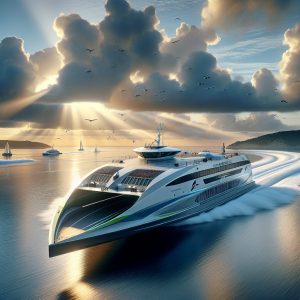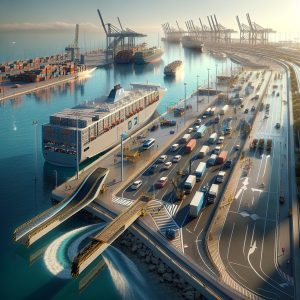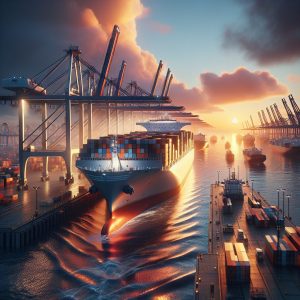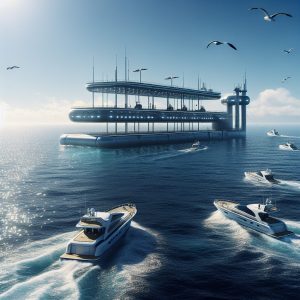Innovation in the Maritime Industry: Japan Moves Towards a Sustainable Future with an Ammonia Supply Centre
In a move that could redefine the future of alternative marine fuels in Asia, three giants of the Japanese industry, ITOCHU Corporation, Toray Industries, and Uyeno Transtech, have signed a Joint Development Agreement to establish the first ammonia supply centre in Japan. This agreement marks a crucial step towards the commercialization of ammonia as a zero-emission marine fuel, in a context where the maritime industry is accelerating its efforts to meet the global decarbonization goals set by the International Maritime Organization (IMO).
A Sustainable Future: Collaborative Development for Next-Generation Fuel Infrastructure
- Ammonia is increasingly being considered as a viable carbon-free fuel alternative, especially for large ocean vessels. Its potential to eliminate carbon dioxide (CO₂) emissions during combustion closely aligns with the revised IMO strategy, aiming to achieve net-zero greenhouse gas emissions in international maritime transport by 2050.
- The new cooperation agreement between these Japanese companies aims to explore the technical, regulatory, and commercial foundations necessary to establish an operational ammonia supply facility. The companies will work together to validate safety protocols, design the necessary infrastructure both on land and on ships, obtain approvals from national authorities, and define commercial terms for supply services.
This initiative not only contributes to the technological advancement of the industry but also presents a significant job opportunity, inviting professionals in the sector to be part of this innovative project. Moreover, the ammonia supply infrastructure represents not only a technological advancement but also a significant shift in how future marine fuels are viewed.
The Role of Each Partner in the Project: A Complementary Approach
- ITOCHU will lead the development of the ammonia supply chain as a marine fuel, leveraging its expertise in coordinating projects and ship-related operations.
- Toray Industries will be responsible for the design and planning of land facilities, as well as coordination with regulatory bodies to ensure the highest standards of safety and efficiency.
- Uyeno Transtech will provide technical expertise related to the ammonia supply vessel, supporting regulatory compliance related to vessel operations.
This complementary collaboration between the three companies will not only ensure compliance with existing regulations but also drive innovation and the development of new technological solutions.
Global Vision: From Trials in Singapore to Deployment in Japan
- ITOCHU has already begun its commitment to ammonia as a future fuel by placing an order for the construction of a new ammonia supply vessel at a national shipyard. Initially, the company plans to demonstrate ammonia supply operations in Singapore, one of the world’s largest marine fuel hubs.
- Successful trials in Singapore will pave the way for the vessel’s potential transfer to Japan, where it will support the expansion of ammonia supply operations in the country. This progressive strategy allows Japan to gradually develop its internal supply capability while benefiting from testing in a high-traffic environment like Singapore.
The development of ammonia as a marine fuel is part of ITOCHU’s comprehensive project, encompassing both the construction of ammonia-powered vessels and the creation of a global bunkering network for this fuel. This global vision aims not only to reduce emissions but also to set a new standard in the maritime industry for the 21st century.
Focus on Life Cycle Emissions and Sustainability
- Integral to the initiative is the conduct of Life Cycle Assessments (LCA) to evaluate the environmental impact of ammonia as a marine fuel throughout the value chain, from production to final use. The results of these assessments will be crucial for future decisions on supply, infrastructure investment, and project scalability.
- ITOCHU’s actions align with its broader sustainability policy, titled “The Brand-new Deal – Profit opportunities are shifting downstream,” focusing on transitioning its portfolio in line with the United Nations Sustainable Development Goals (SDGs), reflecting a firm commitment to environmental sustainability and climate change.
The commitment to sustainability not only addresses environmental concerns but also tackles the need to transform the maritime industry into a more responsible and efficient sector. The use of ammonia as a marine fuel could experience significant growth in the coming years, leveraging technological innovations and regulatory advancements.
A Decisive Moment for Ammonia as a Marine Fuel
- As maritime transport moves away from fossil fuels, ammonia is gaining ground as a viable alternative thanks to its zero-carbon potential and compatibility with large-scale maritime operations.
- The joint initiative of ITOCHU, Toray, and Uyeno represents a concrete push towards a more sustainable and environmentally friendly maritime industry.






